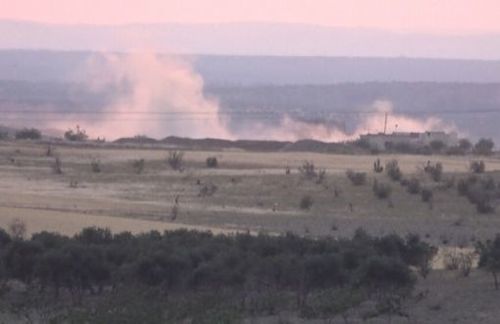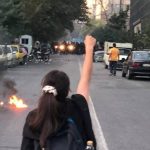e
Türkiye continues shelling areas controlled by Kurdish groups in northern Syria following Sunday’s (November 20) airstrikes along northern Syria and Iraq’s Kurdistan region.
Over the past two days, attacks were also launched against Türkiye, with a rocket attack targeting a police station near the Öncüpınar Border Crossing and injuring eight security personnel. The Afrin Liberation Forces (HRE) claimed the attack.
In a mortar attack on the Karkamış district of Antep yesterday, three civilians, including a child, were killed and six others were injured. No group claimed responsibility for the attack.
In response, Türkiye has conducted “punishment shelling” targeting several areas near the border, the state-run Anadolu Agency (AA) reported.
The bombardments targeted areas controlled by the Syrian Democratic Forces (SDF) in the countryside of Aleppo, Manbij and Kobanî, according to the London-based Syrian Observatory for Human Rights (SOHR).
In Sunday’s airstrikes, Türkiye used about 70 aircraft to hit 89 targets in Syria and Iraq, according to the government. Forty-four targets at a depth of 20 kilometers were hit from Syria’s northwest to northeast.
The strikes were in “retaliation” for deadly November 13 bomb attack in İstanbul, for which the government held the Kurdistan Workers’ Party (PKK) and “its extensions in Syria” responsible. Those groups denied involvement in the attack.
President Recep Tayyip Erdoğan said following the strikes that Türkiye’s military operations in Syria and Iraq would not be limited to an air campaign.
Calls for restraint
Ned Price, the US State Department spokesperson, called for de-escalation in a written statement yesterday.
Expressing condolences for the losses of civilian lives in Türkiye and Syria, he said, “We urge de-escalation in Syria to protect civilian life and support the common goal of defeating ISIS. We continue to oppose any uncoordinated military action in Iraq that violates Iraq’s sovereignty.”
Alexander Lavrentyev, Russia’s special presidential envoy for Syria, called on Türkiye to show restraint to prevent an escalation.
“We will call on our Turkish colleagues to show certain restraint in order to prevent an escalation of tension, not only in the northern and northeastern regions of Syria, but throughout the entire territory,” Sputnik quoted him as saying at the beginning of the 19th round of talks on the Syrian settlement in Astana.
Iraq’s Ministry of Foreign Affairs condemned Türkiye’s airstrikes in the Kurdistan region, which it said violated international law and Iraq’s sovereignty.
Roberta Metsola, the president of the European Parliament, also called on Türkiye to exercise restraint and respect international rights during a speech in Strasbourg yesterday.
Tobias Billström, the foreign minister of Sweden, said Türkiye has the right to defend itself against terrorism but its steps should be proportionate, echoing a statement from NATO Secretary General Jens Stoltenberg a day ago.
Türkiye’s military intervention in SyriaSince 2016, Türkiye has carried out four major military operations in Syria, targeting the Kurdish-controlled areas in two of them. In an offensive in early 2018, it captured the northwestern city of Afrin and its surrounding regions from the SDF. In October 2019, it took control of the towns of Tell Abyad, Suluk and Serê Kaniyê (Ras al-Ayn). Ankara has since then expressed its intentions to create a 30-kilometer “safe zone” along the Syria-Türkiye border. President Recep Tayyip Erdoğan in late May said Türkiye would start a new operation to achieve their purpose, but Russia, Iran and the US opposed such an offensive. Türkiye and its allied groups currently control several regions in northwestern Syria, with the Turkish Armed Forces (TSK) also having a significant military presence in Idlib, the jihadist stronghold. |
(VK)
Source:Bianet



